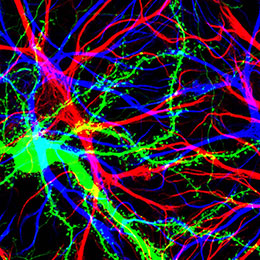Multiple Sclerosis and Complementary Health Approaches

Many people with multiple sclerosis (MS) use complementary health approaches to help reduce relapses or relieve symptoms, such as pain, muscle spasticity, fatigue, cognition, and depression. Some mind and body practices, such as yoga, may help ease some symptoms of MS, but there is currently no definitive evidence to suggest that any dietary supplement is effective to reduce relapses or symptoms of MS.
The American Academy of Neurology issued evidence-based guidelines in 2014 on complementary and alternative medicine use for MS and reaffirmed the guidelines in February 2023. These guidelines concluded that evidence was available to develop practice recommendations for use of cannabinoids, ginkgo biloba, low-fat diet with omega-3 supplementation, magnet therapy, reflexology, and bee venom therapy. This issue of the digest provides the state of the evidence for some of these and other commonly used complementary health approaches for MS as well as others.
What the Science Says:
Multiple Sclerosis and Complementary Health Approaches
Modality and Summary of Current Research
There is some limited evidence suggesting beneficial short-term effects of yoga on fatigue and mood in people with MS, but scientific studies overall had a high risk of bias, and definitive conclusions could not be drawn.
A 6-week course of Swedish massage may help improve quality of life in some people with MS, compared with usual treatment.
There is some limited, low-level evidence that suggests that magnet therapy may have modest beneficial effects on spasticity outcomes in people with MS, but the studies have been of low methodological quality. There are also some data from two studies suggesting that magnet therapy may be useful in reducing fatigue in people with relapsing-remitting MS.
Although hyperbaric oxygen therapy is often heavily marketed to people with MS, there are no consistent data that support the use of hyperbaric oxygen therapy for the treatment of MS.
Read more about the research on hyperbaric oxygen therapy for MS
Based on available evidence, cannabinoids may relieve spasticity and/or pain in people with MS; however, no marijuana-derived medications are approved by the U.S. Food and Drug Administration to treat MS. Sativex (equal mix of tetrahydrocannabinol (THC) and cannabidiol (CBD)) has received regulatory approval in several European countries, including Spain, and Canada for the treatment of spasticity (muscle stiffness/spasm) due to MS. There are insufficient data to determine if smoking marijuana ameliorates symptoms of MS.
According to 2014 clinical practice guidelines issued by the American Academy of Neurology, there is strong evidence that Ginkgo biloba is ineffective for improving cognitive function in people with MS.
Although some studies on omega-3 fatty acid supplementation have shown some beneficial effects on relapse rates, inflammation, and improving quality of life, currently there is insufficient evidence to assess any real beneficial effects of omega-3 fatty acid supplementation on MS.
To date, results of studies have been conflicting as to whether vitamin D may provide a therapeutic benefit for people with MS. A 2018 Cochrane review found very low-quality evidence suggesting no benefit of vitamin D for patient-important outcomes among people with MS. Similarly, a 2024 systematic review and meta-analysis of 9 studies involving 867 participants found that vitamin D supplementation had no significant impact on clinical outcomes in people with MS.
Clinical Guidelines
- Complementary and Alternative Medicine in Multiple Sclerosis (American Academy of Neurology)
Information for Your Patients
NCCIH Clinical Digest is a service of the National Center for Complementary and Integrative Health, NIH, DHHS. NCCIH Clinical Digest, a monthly e-newsletter, offers evidence-based information on complementary health approaches, including scientific literature searches, summaries of NCCIH-funded research, fact sheets for patients, and more.
The National Center for Complementary and Integrative Health is dedicated to exploring complementary health products and practices in the context of rigorous science, training complementary health researchers, and disseminating authoritative information to the public and professionals. For additional information, call NCCIH’s Clearinghouse toll-free at 1-888-644-6226, or visit the NCCIH website at nccih.nih.gov. NCCIH is 1 of 27 institutes and centers at the National Institutes of Health, the Federal focal point for medical research in the United States.
Copyright
Content is in the public domain and may be reprinted, except if marked as copyrighted (©). Please credit the National Center for Complementary and Integrative Health as the source. All copyrighted material is the property of its respective owners and may not be reprinted without their permission.